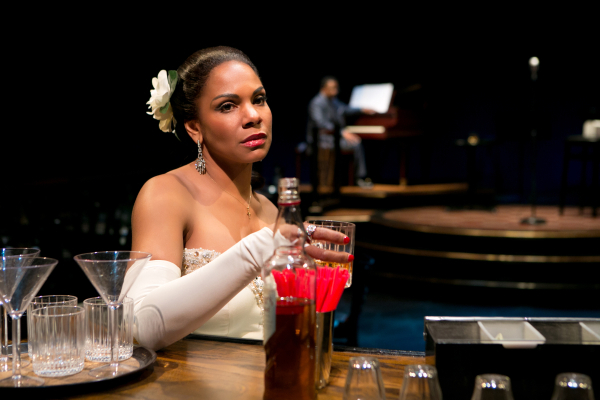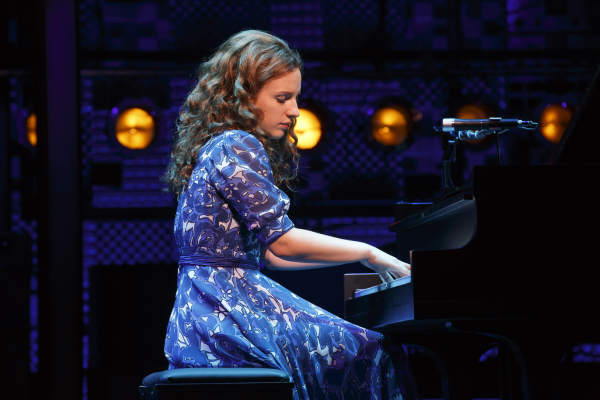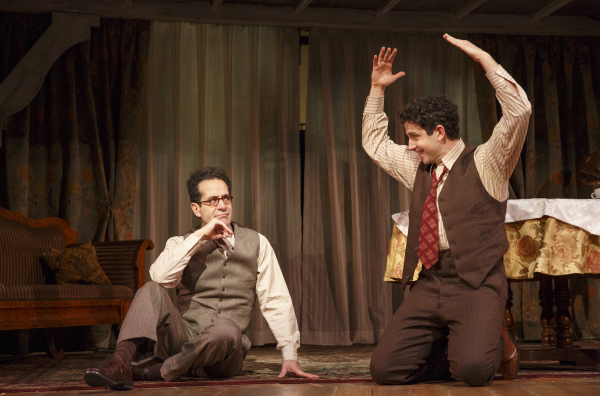Getting Real on Broadway
Billie Holiday. Lyndon B. Johnson. Carole King. Janis Joplin. George S. Kaufman. Broadway has often looked to real-life people for inspiration, but now these staples of American culture are actually the tent poles of Broadway's hottest tickets. In the 2013-14 season, seven actors received Tony nominations for portraying influential figures, ranging from politicians to performers and writers. Theatergoers even had the chance to catch sports figures and a rapping rabbi among the array of factual characters bringing reality to the Great White Way. With Lady Day at Emerson's Bar & Grill, All the Way, Beautiful — The Carole King Musical, A Night With Janis Joplin, and Act One all prominent in this year's awards circuit, it's clear that producers are aware of theatergoers' inherent interest in a true-life tale.

(© Evgenia Eliseeva)
Why Reality?
"I think we have this sort of split where we want to see people [who] are just like us, and we want to see people [who] are perfect," says Jessie Mueller, who portrays Carole King in Beautiful — The Carole King Musical. "There's an interesting thing going on in our culture. We put some [famous people] up on these pedestals, but then we're sometimes sickly thrilled when we see that they've gone the downward spiral and they're just as messed up as we are at some things. We look for leaders and icons to try to help us with our map."
Tony Shalhoub, who portrays the playwrights/directors Moss Hart and George S. Kaufman (as well as Hart's father, Barnett Hart) in Act One, feels that the trend may come from people wanting to see shows about real people who have built careers out of being creative. "Anyone can sort of make their own little shows and movies now," he says. "Maybe everybody wants to get into the act and see stories about real writers and artists achieving the same goals."
Theatergoers may recall the work and lives of the people being represented onstage, but according to Mueller, Beautiful is unique in that its key players — Gerry Goffin (Jake Epstein), Cynthia Weil (Anika Larsen), Barry Mann (Jarrod Spector), and Carole King, are still "around and doing their thing."
"People I talk to at the stage door have such a personal history with her and her music, and such a love for her," she says. However, this can also create an added hurdle in bringing the role of Ms. King to life eight times each week.

(© Joan Marcus)
Challenging Choices
"There's playing the real-life person, and then there's playing the real-life person who is still alive and still kicking ass," laughs Mueller. For her, an impersonation was out of the question. "The biggest challenge for me was that there is something to compare it to. If I did an exact copy, I think it would come off as false because somehow an audience would know that it wasn't true," she says. "You're not just using words on the page. I knew I wasn't capable of [an imitation]. Her voice and her look are too unique…Carole is authentic, and she is truly doing it in her way; she doesn't do it like anybody else. It's a very hard bar to reach, and also quite intimidating, but that's also one of the things that attracted me to the part!"
For Audra McDonald, the challenge was in finding an entirely different voice. McDonald's famous soprano is nowhere to be heard in her portrayal of Billie Holiday in Lady Day at Emerson's Bar & Grill, making her performance that much more of a triumph. "Trying to interpret her songs with my own voice would just make no sense; it would be too disconnected," McDonald says when considering Holiday's deep, throaty sound. "The biggest challenge was trying to inhabit that voice and then putting an emotional character behind it. Some days in rehearsal, all I had was her voice, and other days all I had was the emotional life. Marrying the two was difficult," McDonald says of initially tackling Holiday. "You have to make sure you're inhabiting their spirit and not just doing an imitation. It's hard to figure out where one begins and the other ends, quite honestly."
The playing field is slightly more relaxed for Shalhoub. "I don't think that many people are familiar with what Moss Hart or George Kaufman looked and sounded like, so I'm able to take certain liberties," he says of tackling his roles in Act One. "Obviously you want to be true to the character, but you don't want to comment on it. I try not to form too many strong opinions of the people I play, especially if they're real-life people!" Shalhoub was also very conscious of not turning the people he is playing into caricatures. "You do want to bring something fresh to it."

(© Joan Marcus)
Making History
"If you look back to that time [1959], there was a style of singing that everybody followed," says McDonald. "Billie Holiday just bucked the trend and said, 'I'm going to sing like me, and nobody else,' and that's what everybody fell for. I think that's a fantastic lesson for young people to learn. And the way Lady Day is written, it could have been told for a lot of African-American people during the first half of the century. It's important to be reminded of that, and not go back and make the same mistakes anymore."
Similarly, Mueller feels that a woman's story of being herself makes Beautiful an appealing show, and an equally important one. "She stood the test of time for so many years because she was brave enough to be like, This is who I am," she says of King. "She was one of the first women to do it that way. There is a myriad of women who would agree that they wouldn't be here if Carole King hadn't done her thing."
Apart from real-life "characters" being themselves, part of the draw is seeing the passion that makes them tick. It was this curiosity that sparked Shalhoub's interest in Act One. "What drew me to Act One was the fact that it's about the world of the theater and the people who are stagestruck," he says. "Moss Hart, though he wasn't OCD, did obsess over his work and he was driven. Whether you want to interpret that drive as raw ambition, or whether it has more to do with an inner mechanism, it becomes a compulsion to do this kind of work and to succeed at it. That's something that people will debate forever, probably."
There's no question that audiences enjoy stories in which the everyman or the underdog achieves his or her dreams. "Only through their gifts did they become who they were supposed to become," says Mueller of those people whose lives are laid out before us on Broadway. "Those are very inspiring stories."











